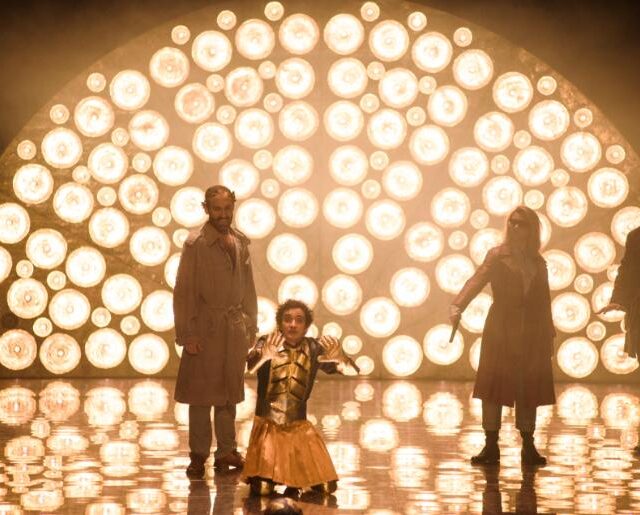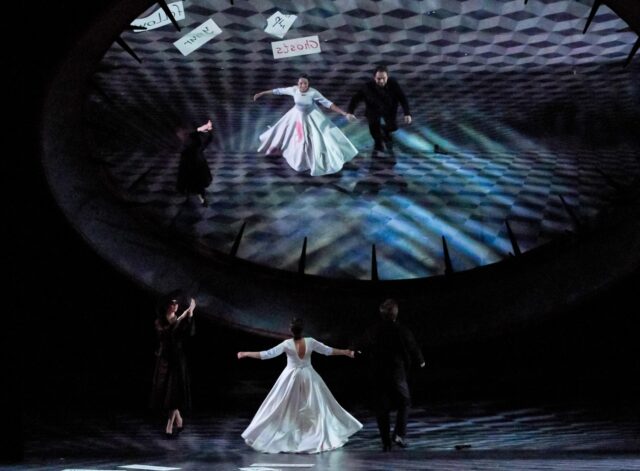
Phaëton

A co-production by Perm Opera and Ballet Theatre and Opéra Royal du Château de Versailles Spectacles in collaboration with Le Poème Harmonique
Tragédie lyrique in five acts with a prologue
Performed in French with Russian subtitles
Libretto by Philippe Quinault
The script for Phaëton — tragédie lyrique by composer Jean-Baptiste Lully and librettist Philippe Quinault — is based on one of the stories from Ovid’s Metamorphoses. Phaëton, the son of Helios and the ocean nymph Clymene, was severely punished by the gods for his pride and ambition. It is sometimes referred to as «the people’s opera», just as Lully’s Atys is referred to as «the king’s opera» (incidentally one of Louis XIV’s favourite works). After its premiere in 1683 at the Palace of Versailles, Phaëton reigned supreme on the Parisian stage until the mid-18th century, with certain musical numbers even permeating the everyday life of those within the more democratic layers of society.
In March 2018, master of baroque theatre, Benjamin Lazar, and the artistic director and conductor of the ensemble Le Poème Harmonique, Vincent Dumestre, will present their version of Phaëton on the Perm stage.
Performed by guest artists, musicAeterna Chorus and Orchestra and Le Poème Harmonique
With the support of ADOR (The Friends of the Royal Opera) and the Institut français
*Le Poème Harmonique is subsidised by the French Ministry of Culture (DRAC of Normandy), the Normandy Region and the City of Rouen.
Le Poème Harmonique is in residency at the Rouen Opera in Normandy.
For rehearsals, Le Poème Harmonique is in residency at the Singer-Polignac Foundation (Paris).
Le Poème Harmonique receives support from Total Foundation, Mécénat Musical Société Générale, Caisse des Dépôts and Lubrizol France.
SYNOPSIS
Characters:
Astrée, goddess of justice
Saturne, god from a former — The Golden — age
Companions of Astrée, followers of Saturne and Astrée
Lybie, daughter of Mérops by his first wife
Théone, daughter of Protée, Phaëton’s lover
Phaëton, son of Climène and the Sun
Climène, daughter of Oceanus, second wife of Mérops
Protée, sea god
Triton, sea god, brother of Climène
Epaphus, son of Jupiter
Mérops, king of Egypt
Le Soleil, The Sun, god
Jupiter, the king of the gods
Oceanus, the divine personification of the sea
Isis, one of the major goddesses in ancient Egypt, mother of Epaphus
Followers of Protée, Followers of Triton, Followers of the Sun — Hours of the Day and Four Seasons, Egyptians, King of Ethiopia, King of India, Ethiopians, Indians
PROLOGUE
Astrée, a goddess of justice, is in her gardens surrounded by her maidens. She has kept her love to humans even though their offence once obliged her to leave the earth and she dreams about the return of the utopian Golden Age. Saturne invites Astrée to descend to the earth with him. He declares the new age of peace and gladness and foretells the appearance of a hero whose deeds will raise human’s desponding spirits and lead to peace.
ACT I
Lybie, a daughter of the Egyptian king Mérops, hides out in solitude expecting Mérops to choose a husband for her. She is afraid he might be the one she doesn’t love. Théone finds her in the shadow of the gardens. says that she envies Théone because her feelings for Phaëton are not connected to duty. Théone is about to say to a friend that everything is not as smooth as it seems but Phaëton shows up. Lybie leaves them alone.
Phaëton has been looking for his mother, so it took him some time to notice Théone. A girl rebukes him for his coldness. Her distrust irritates Phaëton: his love neither hot nor cold — it is the kind he can offer. Climène appears and interrupts an uncomfortable conversation, Théone leaves.
Phaëton unburdens his heart to mother: the possibility that Mérops gives his blessings to Lybie and Epaphus and then Epaphus becomes a king weighs upon his spirits. Phaëton disgusts the possible subjugation to Epaphus. Even though Epaphus is a son of Jupiter, but he, Phaëton, is a son of The Sun.
Climène promises her son that he will be the chosen one, not Epaphus. Though Phaëton’s love to Théone might be his only obstacle to the throne. Climène advises him to give his love up for greatness. Phaëton is ready for anything.
Climène feels glad about his answer but she worries about a dark augury. She decides to talk to Protée, a foreteller. Protée comes out the sea and hides in a cave to rest. Climène asks her brother Triton to find out what is going to happen to Phaëton. Triton with his followers wakes Protée up and calls to share their gladness and joy. Protée declines the invitation. Then Triton asks Protée to reveal the secret of prophecy about Climène’s son to her, but Protée refuses. He tries to slip away transforming into a lion, a tree, a sea monster, a fountain, a fire, but followers of Triton chase him steadily. After numerous transformations Protée finally returns to his original look. And he breaks the silence: Phaëton will raise, but it will lead him to death, The Skies will punish him, and even his father, the Sun, won’t help.
ACT II
Climène tries to talk Phaëton out of achieving the throne but he has already been captured by the idea of power. His mother tries to evoke Phaëton’s love to Théone but Phaëton doesn’t listen to her. Even anger of The Skies doesn’t scare him. He prefers the triumphal death to ordinary life in the shadow of fame.
While being alone, Théone repents of having believed Phaëton’s pointless promises. Lybie appears; she still doesn’t know what her father has decided. Théone notes that ignorance lefts hope at least; disfavor from a beloved one is hundred times worse for her. Sad news comes with Epaphus: the king has chosen Phaëton, not Epaphus to marry Lybie.
In his palace Mérops proclaims his decision: Phaëton will take Lybie to wife and get the right to reign over Egypt. Guests and followers glorify the king.
ACT III
Phaëton explains everything to Théone; he admits he doesn’t love Lybie and their marriage is just a matter of politics. In despair Théone begs The Skies to punish Phaëton but takes her words back at the same moment since she still loves him and doesn’t want him to suffer actually. Phaëton is charmed by the shine of her eyes in tears like for the first time. Meanwhile, he has to go to oath Isis.
In the temple Phaëton meets Epaphus, the son of Isis. The rivals measure the power of whose divine father is the greatest. Epaphus says he doubts if Phaëton is really a son of the Sun; there’s nothing that proves his descent excepting Climène’s words. Phaëton promises to provide an irrefutable evidence.
Ceremonial procession led by Mérops and Climène courses to the Isis temple. Once Epaphus runs forward; he can’t believe that plentiful gifts have made the great goddess blind. At this very moment it thunders and the temple gates close. Phaëton comes along to open the gates but they open themselves. So, it’s an abyss full of fire that has replaced the altar. Bowls with gifts get knocked over, the crowd steps backwards and only Phaëton keeps standing. He calls his mother for evidences that he is a real son of the Sun. Climène swears that’s true. At this moment winds come down to get Phaëton up to the Sun’s palace.
ACT IV
The Sun’s palace. Hours of the Day and Four Seasons glorify the Sun. He is looking forward to his son.
Phaëton’s dream comes true: he meets his father. The Sun wonders why Phaëton looks so sad. Phaëton says others have doubted his descent so they have offended not only him but his father as well. The Sun promises to do everything needed to help Phaëton. Phaëton asks to let him drive a chariot that his father goes by and lightens the sky. The young man denies warnings of how dangerous this driving could be and reminds his father about the promise. As Phaëton is uncompromising, the Sun agrees though he feels something bad is going to happen.
ACT V
Night is ending. Phaëton who drives the sun-chariot rises. Climène sees that and rushes to tell everyone about her son’s glory. Humans run to follow her. Epaphus begs his father Jupiter and mother Isis to revenge for their son’s disgrace and not let Phaëton rise. Lybie gets torn by duty and desire; Epaphus promises her they could be together again.
Mérops, Climène and Egyptians welcome Phaëton, the new Sun, who lightens the world. But Théone feels sad since she remembers her father Protée predicted Phaëton will die if he rises.
Once frightening light gets shed over the sky: Phaëton is losing control over the sun-chariot. The goddess Earth hides into a cave to escape drying out. Jupiter’s voice thunders; he says the madman must die for life and the good in this world. The supreme god kills Phaëton by his lightning and makes him fall down. Protée’s prediction has come true.
Stage Directors
Choirmaster-director
Assistant Lighting Designer
Vincent Dumestre
Musical Director and Conductor
Benjamin Lazar
Stage Director
Mathieu Lorry-Dupuy
Production Designer
Alain Blanchot
Costume Designer
Matilda Banmussa
Makeup and hair
François Menou
Lighting Designer


